The Dai-ichi Life Group has promoted business diversification and geographical diversification proactively, seeking to enhance its sustainable creation of value. We invited Nicholas E. Benes, Representative Director of The Board Director Training Institute of Japan—who has extensive knowledge in the area—to discuss the Dai-ichi Life Group's ideals for its future governance.
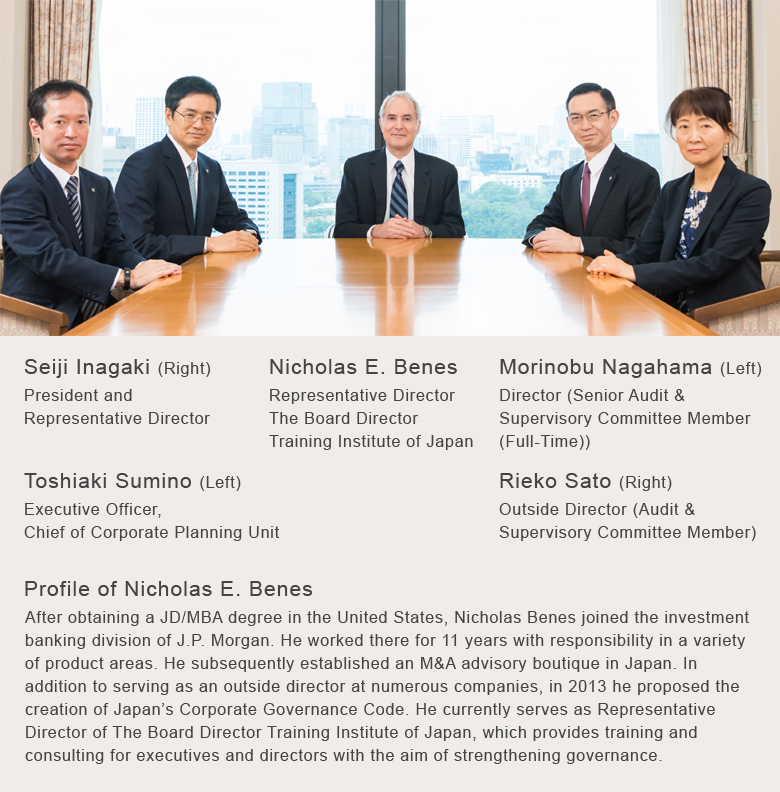
Outline of the Stakeholder Dialogue
| Theme | Aiming to Build a Global Governance System that Achieves Sustainable Value Creation |
|---|---|
| External Stakeholder |
|
| Participants from the Company |
|
- *
The affiliation and position are at the time when the dialogue was held for producing Annual Report (published in August, 2017).
Building a governance system that supports the expansion and diversification of business
The Group transformed itself through demutualization and shifted to a holding company structure to respond swiftly and optimally to changes in the business environmen
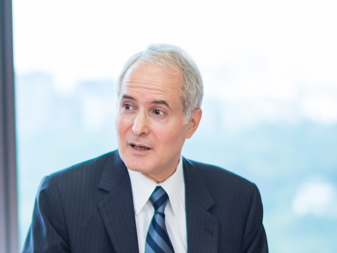
Benes Management at Dai-ichi Life has changed significantly over the past 10 years, with overseas expansion in 2007, demutualizing and listing in 2010, and shifting to a holding company structure in 2016. Could you explain the background to these changes?
Inagaki The domestic life insurance business environment has become increasingly challenging. Take the declining population and the introduction of the negative-interest-rate policy, for example. In this environment, the Group has promoted both business and geographical diversification in order to maintain its ability to sustainably create value. Specifically, we have created three domestic life insurance companies, expanded into the overseas life insurance business, including the Asia-Pacific region and the U.S., and strengthened our domestic and overseas asset management businesses. We have now become a diversified group with three domestic life insurance companies, six overseas life insurance companies, and two domestic and overseas asset management companies. We have continuously sought to develop the optimal governance system for tackling changes in the business environment and achieving healthy growth. The results of these efforts translated into the process of shifting from a mutual company to a stock company, and then to a holding company structure.
Benes What were the main objectives for shifting to a holding company structure?
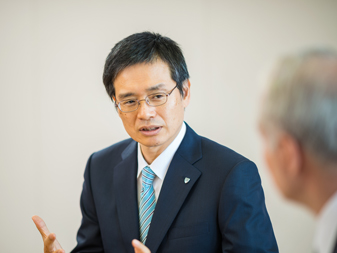
Inagaki The Group aims to speed up growth through the reallocation of capital within the Group. Within the Group, an extremely large but mature domestic life insurance business co-exists with new businesses that have yet to grow to significant size. We opted for a holding company that can focus on governance of the entire Group, rather than giving a single operating company the role of appropriately and swiftly determining how much capital to allocate to each business. Another objective was to build the business foundation for executing bold strategies in the future. For example, whereas the business scope of subsidiaries of life insurance companies is strictly regulated under the Insurance Business Act, an insurance holding company can expand into a wide range of business.
Pursuing best practice as a company with an Audit & Supervisory Committee
Leveraging a sophisticated internal control system in pursuit of highly effective governance
Benes Could you explain the reasons why Dai-ichi Life Holdings chose to be a company with an Audit & Supervisory Committee?
Inagaki Before our final decision, there were differing opinions, and we had serious discussions with all members of our board and senior executives. The reason why we finally decided to be a company with an Audit & Supervisory Committee was the belief that since the holding company’s main duty is the management and administration of Group companies, it is best for its Board of Directors to act as a "monitoring board" focusing on supervisory functions.
Benes Do you think governance is working well, as a company with an Audit & Supervisory Committee?
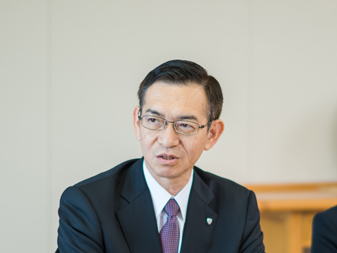
Nagahama Yes. The Audit & Supervisory Committee at Dai-ichi Life Holdings strives to ensure highly effective governance. Once we launched the system, we wanted to run it as one having the best practices. We set high standards, taking into account the Companies Act and the expectations of society, and based on the know-how we have built up to date. I myself have been involved in the Company's internal control system for a long time, having also served as the officer in charge of internal auditing. At present, as the Chairman of the Audit & Supervisory Committee, I am constantly working to increase the efficiency of supervision while utilizing the internal control system, including liaising between the internal audit units and our external audit firm.
Benes The life insurance business is based on long-term policies that run for several decades. Actuarial accounting is also complex, so a high level of expertise and a long-term management perspective is required. Is it difficult to deeply understand the business and make the supervisory functions work?
Nagahama At the Audit & Supervisory Committee, we take plenty of time to interview each executive officer. After identifying the business issues raised by each executive, we check whether and how these issues are actually addressed in the execution of duties by that person.
Sato In the beginning, I did not necessarily support adoption of the Audit & Supervisory Committee system. The corporate auditor (kansayaku) system is unique to Japan and is sometimes described as difficult for people from overseas to understand, but its corporate auditors are endowed with extremely strong authorities and an "independent decision-making" system in which each individual corporate auditor can request reports and carry out investigations. So, some argue that governance functions meaningfully because of this aspect. Compared to this, in the case of the Audit & Supervisory Committee, it is not the individual members who have the authority to investigate but the committee that makes such decisions, as a group. Nevertheless, in the course of discussions, I came to recognize that an extremely sophisticated internal control system was already established at the Company. I realized that if it was linked well to the internal control system, the functions of the Audit & Supervisory Committee would be fulfilled when an issue was raised by an outside director, even if that person did not have an individual authority to investigate. Believing that Dai-ichi Life Holdings could achieve highly effective governance that would be a model to other companies with an Audit & Supervisory Committee if we "aim for best practice," I supported adoption of the new system on that assumption. Now that we have made the transition, my concerns have been eliminated, and I actually think that we can check the appropriateness of the execution of directorial duties more widely than regular corporate auditors.
Benes How do you make sure that the outside directors are informed well enough to maintain effective oversight?
Nagahama Since the establishment of the holding company in October 2016, the Board of Directors has met 12 times, and the Audit & Supervisory Committee has met more frequently. In addition to that, preliminary briefings are held for the outside directors, depending on the importance of the agenda items.
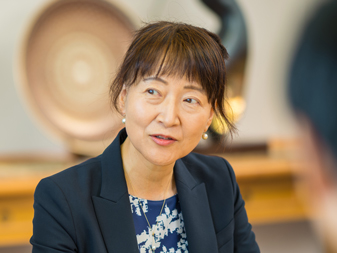
Sato Including some internal events we participate in so that we can understand the business better, I think we actually visit the Company about three times a month. Also, I do think that the outside directors are well informed, including the advance distribution of materials for the Board of Directors. Moreover, aside from meetings that are conducted internally, we have independently held "executive session" meetings that allow for free discussion between the outside board members, in order to deepen our understanding of agenda items and enhance discussions.
Benes That's an extremely positive initiative. Exchanging opinions in such forums will stimulate discussion at the Board of Directors.
Inagaki I myself have served on the Board of Directors at U.S.-based Janus Capital Group (now Janus Henderson Group) as an outside director. We had onsite meetings once a quarter in principle, with video conferences held when necessary.
Benes There is also the approach of reducing the frequency of meetings while deepening debate at each individual meeting. Were there any other initiatives like that at the Janus Board of Directors that could be instructive?
Inagaki At the Audit Committee, which was a sub-committee to the Board of Directors, there were various innovations to enhance the effectiveness of governance. For example, the executive directors would leave the meeting to give the Audit Committee members, composed of the auditor and the outside directors, the opportunity to exchange opinions among themselves. I felt that it was a very sound organization. We hope to pursue the best governance for the Group while also learning from such cases at overseas companies.
Building a global management system in anticipation of the next generation
Focusing on securing and training diverse personnel as a true global company
Benes The overseas business has come to account for about 30% of consolidated net income in fiscal 2016, so having a global management structure will be even more important going forward. Could you explain under what kind of structure you currently use?
Sumino We supervise and support each overseas Group company through regional headquarters established in New York and Singapore. We hold an Executive Summit with the aim of sharing our corporate philosophy and values with overseas Group management. We also try to share information, strategies and policies at each level within the Group at events such as the Global Management Conference, where managers from each company get together.
Benes Are there any cases in which the management of overseas Group companies take part in the management of the holding company?
Inagaki At the moment, there are five executives who are treated as executive officers of the Company, and they take part onsite or by conference call when we deliberate on overseas strategy matters.
Benes Training the next generation of personnel to run the global business in the future is also important.
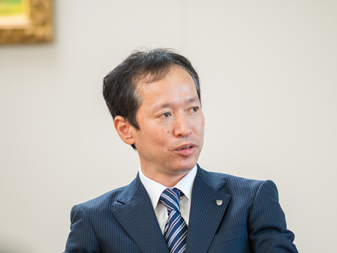
Sumino Exactly. In order to build up a diverse employee base, we are actively promoting mid-career employment and the employment of non-Japanese personnel, in addition to hiring new college graduates. While expanding the pool of human capital in this way, I hope that we will also be able to train people who can drive the overseas business, and develop candidates for next-generation executive positions in the process. We are also enhancing global employee interaction and training programs. In fiscal 2016, about 30 overseas Group employees participated in interaction programs in Japan, and we plan to increase this number to around 50 in fiscal 2017. In conjunction with these efforts, I think we have to develop a multi-lingual internal information infrastructure, to support the globalization of our business.
Benes Speaking from my own experience, increasing diversity and cementing human networks within the Group will be a major advantage in remaining globally competitive. The individual strengths of talented personnel combined with human networks will surely help you to overcome the challenges you face to come up with new ideas.
"Respecting each other, learning from each other, growing together"
Benes I think that when you try to strengthen the supervisory and oversight functions for overseas Group companies, there is always a possibility of friction due to cultural differences and other factors. As a holding company, what approach do you take to this?
Inagaki The life insurance business is basically a local business, and it is a business that will not run well based on top-down instructions and orders alone. Koichiro Watanabe, Chairman of the Board, expressed the approach that forms the basis of the Company's global management, in the concepts of "respecting each other," "learning from each other," and "growing together." At a very fundamental level, I think that these concepts express the essence of good governance. The Dai-ichi Life Group has treasured this mindset since the days when it was a mutual company devoted to the domestic life insurance business. These concepts have remained alive after the Group has transformed itself through business and geographical diversification, and I would like to make sure that they will be resolutely passed on in the future.